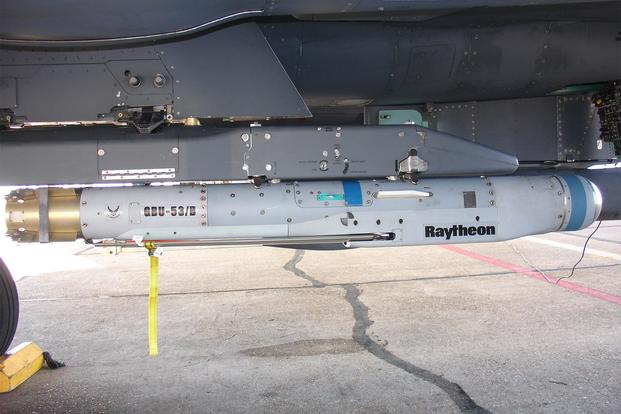Two leading U.S. defense companies have announced they plan to merge, creating a new industry giant that may rank second behind Boeing Co. in the defense and aerospace market.
Raytheon Co. and United Technologies Corp. will combine to create "Raytheon Technologies Corporation" sometime in 2020 pending government approval, the companies said in an announcement Sunday.
"The merger of United Technologies and Raytheon brings together two aerospace and defense leaders with long track records of industry-defining innovation," officials said on their new team website, futureofaerospacedefense.com. "The combination of highly complementary portfolios and world-class [research and development] platforms will enable Raytheon Technologies to invest, innovate and serve our customers."
The combined business could be worth more than $120 billion market value, various financial experts told media outlets following the announcement. The new company is also projecting $74 billion in annual sales, second only to Boeing Co., which reported roughly $101 billion in sales last year, according to NBC.
Raytheon, headquartered in Massachusetts, makes diverse electronic systems, along with guidance systems that can intercept missiles and a myriad of precision-strike weapons, among other equipment. UTC, headquartered in Connecticut, has a vast portfolio of aerospace systems and aircraft engines.
The Raytheon-UTC marriage is one of a series of defense industry consolidations in recent years. Here's a rundown of companies that have recently merged, or are in the process of doing so:
UTC already bought Rockwell Collins: In 2017, UTC announced it would acquire Rockwell Collins to create Collins Aerospace. UTC closed the $30 billion deal with Rockwell, which makes receivers, transmitters and navigation systems, in 2018. Pratt & Whitney, a global aircraft engine manufacturer, is also a subsidiary of UTC.
Northrop-Orbital ATK: Northrop Grumman, an aerospace giant best known for its creation of the B-2 Spirit stealth bomber and the upcoming B-21 Raider, announced it was buying Orbital ATK last year for $9.2 billion. The company paid $7.8 billion and assumed $1.4 billion in debt to acquire Orbital, which creates rocket motors and launch vehicles. Orbital Sciences Corporation and Alliant Techsystems (ATK) previously merged for $4.5 billion.
Lockheed-Sikorsky: Lockheed in 2015 firmed up plans to buy Sikorsky helicopter company from UTC for $9 billion. Lockheed, the world's largest defense contractor, most notably produces the F-35 Joint Strike Fighter and various missile system technology, including the Patriot Advanced Capability-3 (PAC-3). The merger added Sikorsky's UH-60 Black Hawk to its portfolio.
L3 Technologies and Harris Corporation: The two companies announced last year they intended to combine and create a new $16 billion aerospace company. Negotiations are still underway, with the merger set for sometime this summer or early fall. Harris, which produces tactical gear, including radios, electronic systems and wireless equipment, had previously acquired Exelis for $4.5 billion.
General Dynamics and CSRA: General Dynamics in 2018 completed its acquisition of CSRA Inc., an IT services company, valued at $9.7 billion. GD, already the parent company to Gulfstream Aerospace, heads various information systems technology and defense aerospace projects.
As with many defense industry mergers, the Raytheon-UTC union is raising concerns from those who fear the result will diminish fair competition for business deals.
President Donald Trump on Monday cited his own worries.
"When I hear they're merging, does that take away more competition?" he said during an interview with CNBC. "It becomes one big, fat, beautiful company, but I have to negotiate, meaning the United States has to buy things, and does that make it less competitive? Because it's already ... not competitive."
Trump's thinking echoes that of then-Defense Secretary Ash Carter. Carter in 2015 said mergers don't always streamline business with the Pentagon.
It is "important to avoid excessive consolidation in the defense industry, to the point where we did not have multiple vendors who could compete with one another on many programs," he told reporters at the time, DefenseOne reported. "We do need a competitive marketplace, to the extent that's possible within the defense industry."
-- Oriana Pawlyk can be reached at oriana.pawlyk@military.com. Follow her on Twitter at @Oriana0214.












